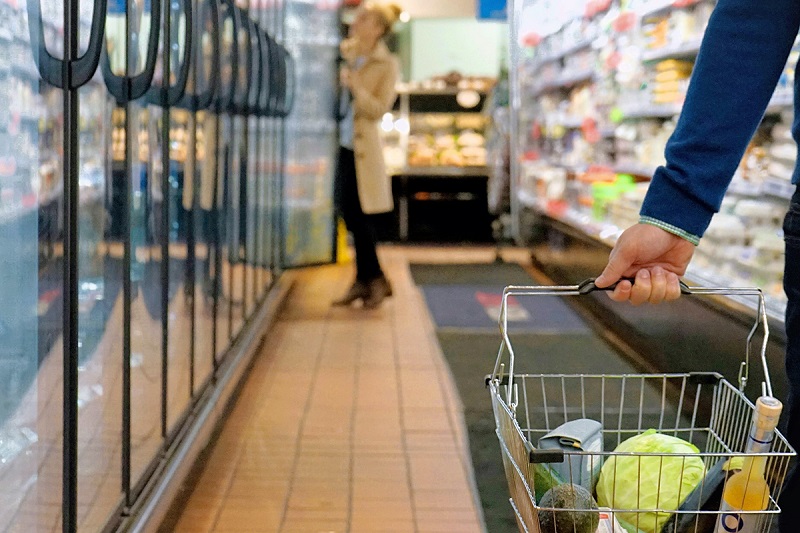If you’ve ever been pregnant, you will have probably heard of listeria. This food-borne bacteria can be very dangerous for pregnant women, and it’s the reason you’re told to avoid deli meat and soft cheese, among other things. Lately, though, news about listeria seems to be everywhere.
Within the past few weeks, the USDA issued a recall on almost 12 million pounds of meat, much of which had been sent to schools for school lunches. Just after that, were more recalls — first on frozen waffles and then soft cheeses. It’s almost too much to keep track of. When I was explaining this to my children, one of them said, “Wait, they make meat and cheese waffles?” No, it’s meat and cheese and waffles. Sorry, kid.

What is going on? Is listeria more prevalent than ever before? Or are there just more panic headlines? Both? What does the data say?
What is listeria?
Listeria monocytogenes is a bacteria. It grows on food products, and it can affect people if they eat it.
Not everyone who consumes contaminated food gets listeria infection. In fact, the risk of illness is quite small. Some people develop standard intestinal symptoms — diarrhea, vomiting — within a few days. The cases are rarely detected, since the symptoms are similar to other pathogens and we do not generally test people with these symptoms to see what is making them sick.
A small share of individuals develop invasive listeria illness; the highest-risk groups are pregnant women and older or immunocompromised adults. This is very rare — the CDC estimates 1,600 cases per year — but it is extremely serious. For pregnant women who develop invasive listeria illness, miscarriage or stillbirth is common. For older people, about 1 in 6 will die. With serious illness, listeria is likely to be identified through testing. However, these serious illnesses develop only weeks after consumption of the impacted food.
One implication of this: it can be very difficult to identify what foods have caused a particular listeria case, because they happened in the past. Most individual cases of listeria are not part of a larger outbreak but are instead isolated incidents where the source is never identified.
Are listeria recalls and listeria outbreaks the same thing?
No, listeria recalls and outbreaks are not the same thing. There is an important distinction between a listeria recall, in which a food or foods is recalled due to concerns about listeria contamination, and a listeria outbreak, in which a cluster of listeria illnesses is identified.
Listeria recalls
Listeria recalls happen when a food safety inspector — either the USDA or the FDA — detects the presence of listeria in a food they are testing, or in a plant that manufactures food. The current recall of meat, for example, is a result of USDA testing detecting the presence of listeria in some BrucePac products. The recall includes any products that might be in the same production facility or in the same production process.
Foods are often recalled for contamination even if there are no linked illnesses. No illnesses have been linked to the current BrucePac recall, the current frozen waffle recall, or the Savencia Cheese USA recall. The trigger for the recall is finding the bacteria in the food.
Both the USDA and the FDA bear some responsibility for food recalls. Fun fact: the USDA is in charge of animal products, and the FDA is in charge of everything else. The details of this are wild — the FDA regulates eggs in the shell and closed-faced sandwiches; the USDA regulates eggs out of the shell and open-faced sandwiches. The government! Keeping us on our toes.
Anyway, both organizations keep counts of recalls over time. The first graph below shows the count of recalls from the FDA data. In 2019 there were only two recalls recorded. Already in 2024, there are 46. So there is no question these have increased over time.
The USDA reports its recalls in weight (pounds of food recalled); see the graph of that data below. This year is a clear outlier here (driven by the 7-million-pound recall of Boar’s Head and 12 million pounds of BrucePac meat). Given the much larger number of food products regulated by the FDA (80% of food is FDA rather than USDA), it is not surprising that the USDA data is noisier.
Listeria outbreaks
Listeria outbreaks occur when the CDC identifies a cluster of listeria cases linked to a particular food or food product. Listeria outbreaks nearly always prompt food recalls, even though food recalls do not always prompt outbreaks. Beginning this summer, there was a large listeria outbreak resulting from Boar’s Head deli meats. This prompted a recall but also significant illness. To date, there have been 59 hospitalizations and 10 deaths as a result of this contamination.
Over the same period beginning in 2019, there has been an increase in listeria hospitalizations. The current year, 2024, is already tracking higher than the previous five, even though it’s only October.
It is important to keep in mind that there is a lot of noise in these data and a single large outbreak can dominate. Over a longer time scale, the recent year with the largest number of hospitalizations was 2011, with 184, nearly all due to a single cantaloupe outbreak.
A final note in comparing recalls and outbreaks is to keep in mind the scale. The Boar’s Head meat outbreak (which originated with liverwurst) is extremely bad in terms of numbers, but as a share of people who consumed the products involved in the recall, it’s small.
Why have these numbers increased?
There is no complete answer here, although most of the explanations come down to regulation, which works in both directions.
On one hand: when we look at recalls in particular, there is now more sophisticated testing. For example, the USDA has a mandate to inspect all processing plants regularly (among other testing it does). As this testing has gotten more sensitive, it is natural that detection will go up. This isn’t necessarily a bad thing — the goal of inspection and recalls is to detect contamination before anyone eats the food.
This explanation alone would account for more recalls, but not for an uptick in cases.
On the other side, some have argued that deregulation during the Trump administration coupled with a shortage of USDA inspectors is responsible for more food-borne illness. While this could account for more illness, it’s perhaps harder to square with more recalls, although perhaps there is an interaction with the sensitivity of the tests.
The numbers here, while in some way large, are actually too small to make it possible to identify a single answer. Especially when we look at outbreaks, a lot of the variation over time is driven by whether you have one single large outbreak. But identifying what underlying systematic reason there was for that is a fool’s errand.
Closing thoughts
Listeria isn’t like some of the other topics I discuss, in the sense that it’s not dismissable. Listeria infection can be very dangerous, especially if you’re pregnant.
At the same time: keep this in perspective. The risks are still relatively small, and, importantly, recalls do not mean illness. If you have frozen waffles or soft cheeses that are part of the recall, you should absolutely toss them. But you shouldn’t assume you have listeria, or even that you’ve been exposed.
In terms of specific action items, other than throwing away recalled food, I am sorry to say there is not much you can do. As I talked about in Expecting Better, listeria is tricky because the large outbreaks are often fairly random. Liverwurst, enoki mushrooms, cantaloupe, salad greens — these are generally not on restricted-food lists (maybe liverwurst, sometimes).
The best you can do is to pay attention to recalls and outbreaks when they happen. If you want to keep up to date, the CDC is your best bet — check out its outbreak alerts here — along with the FDA recalls.
The bottom line
- Listeria monocytogenes is a bacteria that can grow on food products and make people sick if they eat it. The highest-risk groups are pregnant women and older or immunocompromised adults, though illness is not common.
- Listeria outbreaks are not the same thing as listeria recalls. Just because there has been a listeria recall, it does not necessarily mean there has been an outbreak.
- Listeria recalls and outbreaks have increased, though it is difficult to pinpoint why.
















Log in